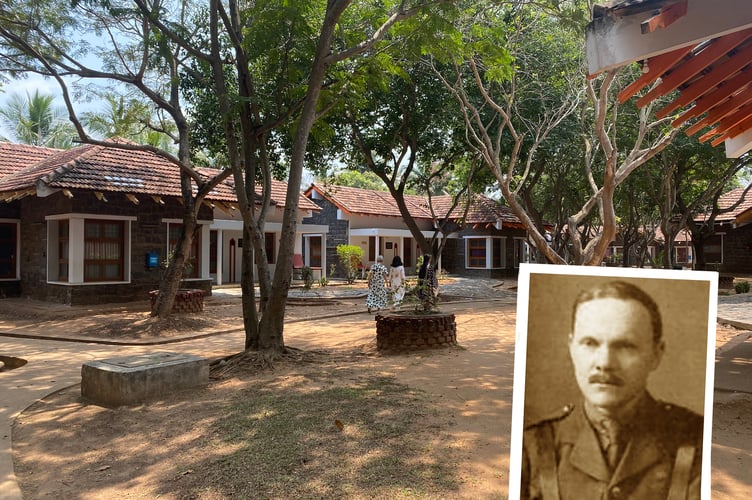WHEN I applied for my Indian e-visa, I was asked to choose between two simple categories: business or pleasure. Neither felt right.
This journey wasn’t work, nor was it a holiday. As I stared at the screen, I realised it was something else entirely. A pilgrimage. To explain why, I need to rewind exactly 20 years.
This spring, 20 years to the day, my wife Lynn and I travelled to Puducherry to realise a long-held ambition; to see the results of what the concert had enabled — and to meet the people behind the scenes as well as some of the children whose lives have been shaped by the Village.
My first impression of Puducherry was that it’s significantly bigger, bolder, and far more intense than I’d imagined — with a population bigger than Birmingham it’s certainly no sleepy seaside town.
Our hotel was situated at the junction of about eight roads, each teeming with mopeds, cars, buses, dogs, cows, and people, all seemingly choreographed by the honk of the car horn. It feels like a city stuck on fast-forward but somehow, it works.
It has tree-lined streets, mustard-coloured colonial villas and chic boutiques. A seaside promenade runs along the Bay of Bengal and passes several statues, i
French colonial facades rub shoulders with concrete malls and wooden street stalls; children dart through alleyways; palm squirrels race across power lines. The air is thick with heat and the mess of humanity.
But despite the visible poverty, my overwhelming impression was mostly one of joy — there’s a vibrant, youthful optimism that lingers even now I’m back home in Ross.
One evening, while returning from the seafront promenade, we passed a tiny woman — surely in her eighties — crouched in the dust, repairing a motorcycle tyre with the nimble dexterity of a lifetime.
It was humbling. I was struck by how her life was so different from mine and it made me reflect on how narrow my worldview can sometimes be.
To someone who has likely lived through corrupt governments, extreme poverty, and probably caste injustice the things we worry about in the ‘West’ — Putin, the onset of tariffs, the climate crisis, mean practically nothing.
Her threats exist in a completely different cosmos … when you have so little to begin with then you have very little to lose, and I made a mental note to remember the moment.
The real heart of our visit, of course, was the SOS Children’s Village. It’s located about 10 miles inland, and we were warmly welcomed by the Village director, Shri, and his fabulous team.
The Village consists of 12 homes, each cared for by a house mother, as well as a learning centre. Additionally, an outreach team supports over 350 vulnerable local families, providing guidance, education and essentials for those children assessed as most at risk.
We toured the homes, met the children, and heard their stories. Some have returned as adults, now pursuing careers or starting families of their own.
The atmosphere was one of structure, care, and gentle joy. Just before we left, one of the children — a talented young artist — presented us with a painting she’d made as a thank-you.
The inscription read: “This painting holds the colours of our dreams made possible by your kindness. Thank you for giving us a place to call home.” At that point, I’m afraid something must have irritated my eyes — they were full of tears.
If that were the end of the story, it would already be a very meaningful trip. But there’s another thread worth sharing — one that reaches back not just 20 years, but nearly a century.
Shortly after the SOS Village was built, I began researching our Victorian-era home in Ross-on-Wye.

In the attic, we’d discovered some striking portraits, and after some digging, I learned they were of the Schomberg family who had deep ties to the town.
One member in particular caught my attention: Lt Col Reginald Charles Schomberg, soldier, explorer, author, intelligence officer, and confidant of Clement Attlee.
After the First World War, he spent a decade exploring the mountains of northern India, writing and reporting. In the 1930s, he shifted into diplomacy — and was appointed British Consul General to the French Territories in India, based in none other than Puducherry.
It struck me as extraordinary: two men, a century apart, both connected to the same house in Ross, both finding themselves drawn to this small corner of southern India.
It’s the sort of odd coincidence that Carl Jung might have called synchronicity. It certainly felt that way to me.
But ultimately, it was the children — those raised in the Village, their carers, their teachers — who left the deepest mark.
To see how a moment of musical compassion could blossom into two decades of shelter, education, and community in India… well, it’s hard to describe. It reminded me that, even in our noisy world, small acts can still echo.
● SOS Children’s Villages works with local partners and communities to empower parents. Each family needs different support so that they can stay together.
This support can include workshops on parenting and children’s rights. Training is also available to parents so they can get the skills they need to get a job or start their own businesses.
When children who cannot stay with their families they can find a new home in SOS Children’s Villages.
Here the children can build safe and lasting relationships. All the children in the organisation’s care have access to education and healthcare.
To help young people become confident and independent, they are given a plan for their future which helps them increase their employment prospects.
For example, young people can attend workshops and trainings run by SOS Children’s Villages. This improves their skills through taking part in different projects with local mentors and businesses.




